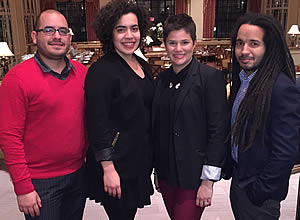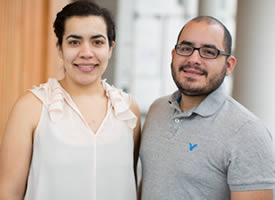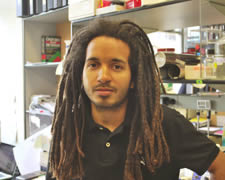

Forging Connections
Einstein Ph.D. Students Join Innovative Career Program
In January, Einstein doctoral candidates Susana Rodríguez-Santiago, Kristian Saied-Santiago and Carlos De León-Rodriguez—all natives of Puerto Rico—were accepted to Yale Ciencia Academy (YCA), an exciting new career development program for graduate students from groups traditionally underrepresented in science. The trio is among 34 applicants selected from across the United States and Puerto Rico to take part in the program’s inaugural year.

Einstein’s Yale Ciencia fellows pose with Dr. Mónica Feliú-Mójer, vice-director of Ciencia Puerto Rico and program coordinator of the Yale Ciencia Academy. (From left): Kristian Saied-Santiago, Susana Rodríguez, Dr. Feliú-Mójer and Carlos De León-Rodriguez.Funded by the National Institutes of Health, YCA is a joint project of Yale University and Ciencia Puerto Rico (CienciaPR), a nonprofit organization that connects Puerto Rican and other scientists, students and educators worldwide interested in doing research in Puerto Rico, through an innovative online platform. The YCA program leverages this large network to connect graduate students in the life and behavioral sciences with a community of peers, mentors and experts and to provide them opportunities for professional exploration, development and outreach.
A Powerful Platform
“The usual path after graduate school is to do a postdoc or even a second postdoc, but that track doesn’t necessarily fit everyone,” noted Ms. Rodríguez. “When you’re focused on meeting the requirements to attain your Ph.D., it’s hard to figure out exactly what you want to do professionally and to know the extra steps you’ll need to take.” Yale Ciencia Academy “fills the gap,” she said, by exposing students to different career pathways while providing practical advice.
The year-long program provides training in science communication, team leadership, mentoring and other essential skills. Each YCA participant also creates an individual development plan and receives feedback on short-term and long-term goals. Additional activities include video conferencing with established scientists and professionals in a range of careers, peer chats and in-person workshops.
Through video conferencing, the 34 YCA students discuss career-related issues with the program’s two directors. They also can view and interact with guest speakers who describe their work and career paths while offering students the opportunity to ask questions.
The visual platform also supports peer chats, allowing students to confer with each other about common concerns, such as what happens if you encounter conflicts with your mentor, how to write a thesis or what to do after receiving your Ph.D.
The YCA fellows have the chance to meet face-to-face during in-person workshops at the American Association for the Advancement of Science annual meeting. “The discussions are especially valuable because they can touch on issues that are unique to us as scientists who are Hispanic,” noted Mr. Saied-Santiago.
Honing a Vision

Susana Rodríguez and Kristian Saied-Santiago“We’re honored to be members of both the Einstein community and the Yale Ciencia Academy,” said Ms. Rodríguez. “Taking part in YCA is already helping each of us in making decisions about our future goals and to see how the academy can aid us in achieving those goals.”
Ms. Rodríguez envisions herself in a leadership role involving science policy and looks forward to clarifying her vision through YCA.
“There are three basic career paths open to aspiring professionals in Puerto Rico,” she explained, “lawyer, doctor or engineer.”
Growing up in San Juan, PR, at first “doctor” seemed the logical choice for a young woman whose passion for biology began in fifth grade. But after interning in a microbiology lab during college, she was hooked on research. She applied and was accepted to the NIH-funded Minority Access to Research Careers program, and came to Einstein after a post-baccalaureate fellowship at Case Western Reserve University.
A fifth-year doctoral candidate in the laboratory of Dr. Charles Query, professor of cell biology, Ms. Rodríguez investigates the mechanism of spliceosomal mutations linked to blood disorders such as leukemia. She expects to defend her thesis next year.
Giving Back at Home
Mr. Saied-Santiago—who is leaning toward a career as a science educator and researcher—credits his high-school biology teacher in Carolina, PR, with sparking his interest in science. He was further inspired by an organic chemistry professor at the University of Puerto Rico’s Río Piedras campus.
“After doing her Ph.D. and postdoc work in the United States, this professor returned to Puerto Rico to establish herself as a teacher and researcher,” he said. “It was brave of her, because research in Puerto Rico can be uncompromising. But it was her dream—and it’s my dream, too.”
He added, “Many people in YCA are interested in building the sciences in Puerto Rico. It’s been a great experience to connect with them.”
In 2011, at the annual Biomedical Research Conference for Minority Students, Mr. Saied-Santiago met Einstein alumnus Radamés Cordero, who is Puerto Rican. “He explained to how diverse and international Einstein is.”
Mr. Saied-Santiago entered Einstein’s graduate program in the biomedical sciences and joined the lab of Dr. Hannes Buelow, where his work on nervous system development in the C. elegans worm, the heparan sulfate molecule and cell migration may help shed light on the development of the nervous system and cancer.
Contributing to Society

Carlos De León-RodriguezCarlos De León-Rodriguez traces his interest in science to an article on the genome project he read during high school. “I was inspired by the potential of biomedical research,” he said. Another article, on the need for geneticists in Puerto Rico, spurred him to set his sights on attaining a Ph.D. He also plans to return to Puerto Rico after earning his degree.
“YCA will help me articulate a vision for my ideal job, surround me with the right mentors for my next steps and allow me to develop the additional skills I’ll need to become a better scientist,” he said. “Ideally, I hope to have a role in industry or education that will match my active lifestyle and have a direct impact on improving society.”
His path thus far includes graduating from the University of Puerto Rico and completing a fellowship at Case Western. He was drawn to Einstein because of its NIH-designated Albert Einstein Cancer Center and its “open-door policy and culture of collaboration,” and by the large Hispanic population in the Bronx.
“I liked the idea that I could serve my community while working toward my doctorate,” he said.
Mr. De León-Rodriguez is completing his doctoral research on C. neoformans and macrophage interactions at Johns Hopkins, where his thesis mentor Dr. Arturo Casadevall—former chair and current adjunct professor of microbiology & immunology at Einstein—is now chair of molecular microbiology & immunology. He aims to emulate Dr. Casadevall’s “love of research, strong work ethic and integrity.”
Paving the Way for Others
“We’re proud of Susana, Kristian and Carlos,” said Dr. Victoria Freedman, Einstein’s associate dean for graduate programs in the biomedical sciences. “I’m confident that the training they’re receiving here at Einstein, coupled with the support of their mentors and peers in YCA, will empower them to make outstanding career choices, excel in their chosen fields and become role models for other aspiring scientists from the Hispanic community.”
Posted on: Wednesday, April 6, 2016

Tablet Blog